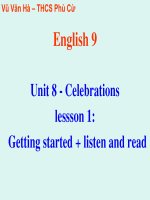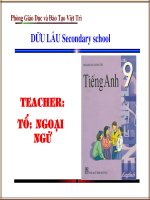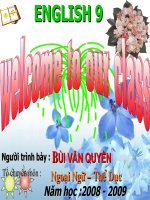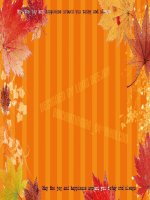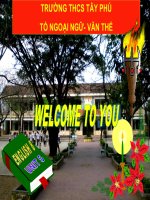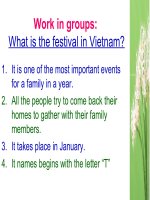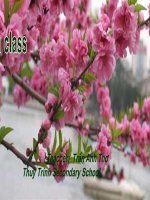Unit 8 Celebrations Listen
Bạn đang xem bản rút gọn của tài liệu. Xem và tải ngay bản đầy đủ của tài liệu tại đây (492.69 KB, 16 trang )
<span class='text_page_counter'>(1)</span>WELCOME 9 H S I L G EN 8 T I N U.
<span class='text_page_counter'>(2)</span> Quiz 1. It is the name of a celebration.. New Year’s 2. This celebration happens fromEve late evening of December 30th to early morning of January 1st. 3. Here are pictures of this celebration....
<span class='text_page_counter'>(3)</span> What do you do at new year’s night? - Watch firework display - Meet friends - Listen to songs - Watch Mr. Apple.
<span class='text_page_counter'>(4)</span>
<span class='text_page_counter'>(5)</span> Unit 8: celebrations. Lesson 3: Listen.
<span class='text_page_counter'>(6)</span> The song Auld Lang Syne.
<span class='text_page_counter'>(7)</span> I. Vocabulary: - Auld Lang Syne: Auld = old ; Lang = long ; Syne = since The good old days. Nh÷ng ngµy xa th©n ¸i - Trusty (adj): đáng tin cậy - Acquaintance (v):. ngêi quen biÕt.
<span class='text_page_counter'>(8)</span> " Auld Lang Syne " is a Scottish poem written by Robert Burns in 1788 and set to music of a traditional song . The song is known in many English-speaking countries and other countries and is often sung in Eve moment to start a new year . When the song to America , it is picked up as soon as the bell performing clock 12 midnight . Ever since 1929 until now , each time to a year old the last time , a new year , thousands of people flocked to Times Square to take wine lyrics of Auld Lang Syne . This song was also used as a farewell on the occasion of funerals, graduations , or in the event marked the end of an old and opening phase a new phase . "Auld Lang Syne" là một bài thơ Scotland viết bởi Robert Burns năm 1788 và được phổ nhạc thành một ca khúc cổ truyền. Bài hát được biết đến ở nhiều nước nói tiếng Anh và cả các quốc gia khác và thường được hát trong thời khắc giao thừa để bắt đầu một năm mới. Khi ca khúc sang Mỹ, nó được chọn biểu diễn ngay khi tiếng chuông đồng hồ điểm 12 giờ đêm. Suốt từ năm 1929 cho đến nay, mỗi khi đến thời điểm một năm cũ qua, một năm mới đến, hàng nghìn người lại đổ dồn về Quảng trường Thời đại để cất vang lời ca của Auld Lang Syne. Bài hát này cũng được sử dụng như một lời chia tay trong các dịp tang ma, lễ tốt nghiệp hoặc trong các sự kiện đánh dấu sự kết thúc của một giai đoạn cũ và mở đầu một giai đoạn mới..
<span class='text_page_counter'>(9)</span> Should auld acquaintance be forgot, and never brought to mind? Should auld acquaintance be forgot, days of auld lang syne? and (1) _________ For auld lang syne, my dear, for auld lang syne, We’ll (2) ________ take a cup of kindness yet, For auld lang syne. Should auld acquaintance be forgot, and never brought to (3) __________ mind ? Should auld acquaintance be forgot, and days of auld lang syne? hand And here’s a (4) ____________ ,my trusty friend and gie’s a hand o’ thine kindness yet, We’ll tak a cup o’ (5) ____________. Auld Lang Syne.
<span class='text_page_counter'>(10)</span> Ex 1: Matching 1. Auld acquaintance. A, người bạn chân thành. 2. Bring to mind. B, của anh ấy. 3. Trusty friend. C, nhớ đến. 4. Take a cup of kindness. D, người quen cũ. 5. Thine. E, nâng ly vì những điều tốt lành.
<span class='text_page_counter'>(11)</span> EX 2: Multiple choice: 1.The poem “Auld Lang Syne ” was written in …………. a. 1780. b. 1785. c. c. 1788. 2. Auld Lang Syne was composed by…………in 1793 a. George Thomson. b. b. Robert Burns. c. Mozart. 3.It is a folk song of…………………… a. England. bb. Scotland. c. German. 4. Auld Lang Syne is a song which sung on……………. a. b. Easter Day. a. our old friends. b. our good old days. a. New Year’s Eve. c. Passover. 5. This song reminds us of ………….. b. c. a and b.
<span class='text_page_counter'>(12)</span> Ex 3: What is the main idea of this song? A. We should forget the old people and things in the past BB. We shouldn’t forget the old people and things in the past C. We should only think of the future.
<span class='text_page_counter'>(13)</span> Let’s sing : Auld Lang Syne.
<span class='text_page_counter'>(14)</span> Scotland của Robert Old Long Syne, của James Watson (1711) Nguyên gốc tiếng Burns Should Old Acquaintance be forgot, and never thought upon; The flames of Love extinguished, and fully past and gone: Is thy sweet Heart now grown so cold, that loving Breast of thine; That thou canst never once reflect on Old long syne. ĐK:On Old long syne my Jo, in Old long syne, That thou canst never once reflect, on Old long syne.My Heart is ravisht with delight, when thee I think upon; All Grief and Sorrow takes the flight, and speedily is gone; The bright resemblance of thy Face, so fills this, Heart of mine; That Force nor Fate can me displease, for Old long syne. ĐK:Since thoughts of thee doth banish grief, when from thee I am gone; will not thy presence yield relief, to this sad Heart of mine: Why doth thy presence me defeat, with excellence divine? Especially when I reflect on Old long syne. Should auld acquaintance be forgot, and never brought to mind? Should auld acquaintance be forgot, and auld lang syne? ĐK:For auld lang syne, my jo, for auld lang syne, we’ll tak a cup o’ kindness yet, for auld lang syne.And surely ye’ll be your pint-stowp! and surely I’ll be mine! And we’ll tak a cup o’ kindness yet, for auld lang syne. ĐK:We twa hae run about the braes, and pu’d the gowans fine; But we’ve wander’d mony a weary foot, sin auld lang syne. ĐK:We twa hae paidl’d i' the burn, frae morning sun till dine; But seas between us braid hae roar’d sin auld lang syne. ĐK:And there’s a hand, my trusty fiere! and gie's a hand o’ thine! And we’ll tak a right gude-willy waught, for auld lang syne.. Tiếng Anh Should old acquaintance be forgot, and never brought to mind? Should old acquaintance be forgot, and old lang syne? ĐK:For auld lang syne, my dear, for auld lang syne, we'll take a cup of kindness yet, for auld lang syne.And surely you’ll buy your pint cup! and surely I’ll buy mine! And we'll take a cup o’ kindness yet,for auld lang syne. ĐK:We two have run about the slopes, and picked the daisies fine; But we’ve wandered many a wearyfoot, since auld lang syne. ĐK:We two have paddled in the stream, from morning sun till dineA; But seas between us broad have roared - since auld lang syne. ĐK:And there’s a hand my trusty friend! And give us a hand o’ thine! And we’ll take a right good-will draught, for auld lang syne..
<span class='text_page_counter'>(15)</span> Auld Lang Syne ám ảnh người nghe bằng những câu hỏi tu từ được láy đi láy lại như một sự mời gọi các kỷ niệm cũ trở về: “… Should auld acquaintance be forgot, and never brought to mind? Should auld acquaintance be forgot, and auld lang syne?” “… Lẽ nào lại quên đi những người bạn cũ năm xưa Và không bao giờ nhớ gì nữa? Lẽ nào quên đi những người bạn xưa ấy Và những ngày xưa êm đềm?” Lời ca như một sự nhắc nhở không bao giờ được lãng quên quá khứ và những người đã đến trong cuộc đời ta. Tất cả kỷ niệm dù cay đắng hay ngọt ngào, tất cả những người đã đến mang theo hạnh phúc hay đau khổ đều góp phần tạo nên con người ta ở hiện tại. Thời khắc giao thừa là khi mọi người tiễn đưa năm cũ với sự luyến tiếc nhẹ nhàng, xen lẫn niềm vui vô bờ khi năm mới đến. Một khởi đầu mới lại đến với những niềm hy vọng ở một tương lai rực rỡ hơn, đẹp đẽ hơn. Ở thời khắc đặc biệt ấy, khúc Auld Lang Syne càng trở nên da diết và xúc động: “… For auld lang syne, my dear, For auld lang syne, We’ll take a cup of kindness yet, For auld lang syne…” “… Cho những ngày xa xưa, bạn ơi Cho những ngày xa xưa ấy Chúng ta cùng nâng ly vì những điều tốt lành Cho những ngày xa xưa…”.
<span class='text_page_counter'>(16)</span> Homework - Practise singing the song - Prepare new lesson: Unit 8, reading + LF 1,2.
<span class='text_page_counter'>(17)</span>
